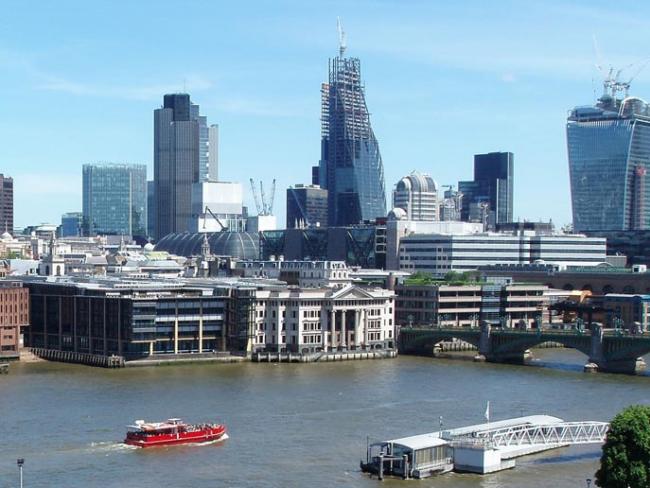
The City: a conduit for siphoning money out of the economy. Photo Workers.
Finance capitalism keeps a malign stranglehold over the real economy, serving only a tiny group of super-wealthy speculators. How did this come about?
Finance capital is typified by the drive to increase profits and to subordinate the production of goods and services for people’s needs. It has developed since the middle of the nineteenth century to become the malign global financial system we know today.
The greatest transformation of finance capital is quite recent. Increased financialisation of capitalism since the 1970s led to new ways of shaping the economy, further stifling productive industry.
Capitalism as it had operated since the end of the Second World War was not running in the interest of finance capital; it had to be overturned. The ruling elites across the world began to clamour for “free” markets. The increased strength of workers across the world was a threat – as were the existence of a socialist USSR and China and successful national independence movements at that time.
The liberalised financial sector, increasingly free of national control or influence, took off worldwide in the 1980s. It became increasingly complex, commandeering economies and in the process drastically altering the structure and functioning of the previous capitalist economic model, predominantly based on corporations.
The leveraged buy-out – funded by borrowings – was a key technique that enabled financial speculators to take over even the largest capitalist corporations using borrowed money. The trick was that once the takeover was complete, debt on the loans was dumped on the targeted firm. In effect, the acquired company paid for its own takeover, and was then looted of its value.
This was an enormous change to the old corporate capitalist universe. It forced firms to load themselves down with debt in order to be less attractive to the financial wolves looking for targets.
Control over the economy shifted from corporate boardrooms to financial markets. Corporations were now viewed as bundles of assets, the more liquid or saleable the better, rather than productive wealth-creating entities.
In turn this fed new outlets for money-capital speculation – making money from money. Financial markets were preferred over investment in capital goods which would provide future GDP growth. Effectively industrial capital, investment in production, became just one aspect of finance capital.
Concentration
The financialisation of monopoly capital has come to characterise world capitalism over the past 50 years. Ownership of the largest companies across the world is increasingly concentrated in a few hands. And those owners are predominantly the various forms of finance capital.
This financial explosion has brought unprecedented increases in company and sovereign debt – along with economic stagnation.
Finance capitalists turned to a separation of the real physical assets used in production from their underlying value. Corporate securities acquired the attribute of liquidity – instant convertibility into cash. Once this stage was reached, the way was open for limitless proliferation of new financial instruments – stock futures, options, derivatives, hedge funds and so on.
This speculative finance spawned a climate of financial euphoria with no root in production or the real economy. Financial bubbles inevitably burst in the end, as happened in 1987, 2000 and 2007-2008 with destructive financial crises.
These cycles of ever-larger speculative financial bubbles together with a run of underlying stagnation and declining growth rates are not accidental. They are increasingly interdependent.
‘Speculative finance spawned a climate of financial euphoria with no root in the real economy…’
A system geared to speculation needs constant new infusions of cash. Much of that comes from the working population through drastic increases in exploitation and social deprivation. Real wages remain stagnant, taxes increase and public services decline. And without real investment, job creation weakens.
The City, the pinnacle of finance capital in Britain, serves no wider public, social or economic purpose. Its claims to place resources where they maximise growth are bogus. It claims to help the economy by directing investment into production and growth, but that’s not been true for many decades.
Draining the economy
Instead the City takes money out of the economy, away from production and enables seizure of the wealth created by real work, as well as people’s savings and pensions. The interests of amoral international capital conflict with Britain’s real interests, particularly our industry.
Successive governments have embraced the treachery in the City. Instead, we need to put Britain, and Britain’s industry, first. The idea of making finance serve our national interest of employing our people in useful work, making what we need is not radical – but the recent development of capitalism shows it is unable to do that.
Capitalism is heading in the other direction. Finance is a predatory monopoly feeding off the real economy. But the dreadful nature of finance capital goes further – it is both anti-democratic and a threat to peace.
Power is now wielded not by elected governments or parliaments, but by unelected figures in Wall Street, the City of London and other financial centres. The views and needs of an exceedingly small number of finance capitalists outweigh the needs of working people who are the vast majority of the population – and who are never asked.
This lack of democracy is the underlying reason for abysmal, aimless, government and why parliament is largely irrelevant.
Rival empires have always competed to carve up the world – but now those modern empires are the creatures of finance capital. Outside national control they start imperialist wars and even the threat of another world war. The stakes are high.
• A longer, more detailed analysis is available here.
